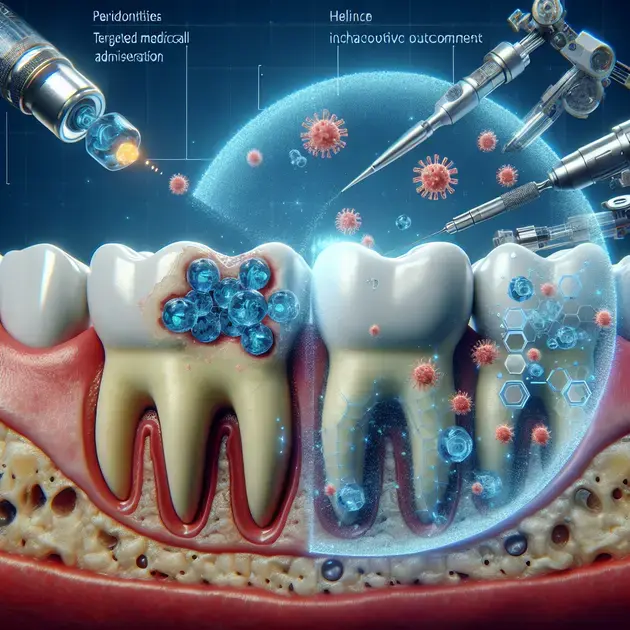When it comes to combating periodontitis, finding the right medication is crucial. In this comprehensive guide, we will explore the most effective medications available to treat this common dental condition.
Periodontitis, a severe form of gum disease, affects millions of people worldwide. It is essential to understand the various treatment options and medications that can help manage and improve this condition. Follow along as we delve into the world of effective medication for periodontitis.

Exploring Treatment Options
When it comes to exploring treatment options for periodontitis, it’s important to first understand the various approaches available. One common method is scaling and root planing, which is a deep cleaning technique performed by a dental professional. This procedure helps to remove plaque and tartar from below the gumline, preventing further progression of the disease. You can find detailed information about scaling and root planing on reputable dental websites like American Dental Association.
Another treatment option to consider is the use of antibiotics to combat the bacterial infection causing periodontitis. Websites like PubMed offer extensive resources on the efficacy of different antibiotics in treating periodontal disease. It’s important to consult with your dentist or periodontist to determine the most suitable antibiotic regimen for your specific condition.
Surgical interventions, such as flap surgery or bone grafting, may also be recommended for advanced cases of periodontitis. Websites like American Academy of Periodontology provide in-depth explanations of these procedures, including what to expect before, during, and after surgery. Understanding the surgical options available can help you make informed decisions about your treatment plan.
Additionally, incorporating lifestyle changes like quitting smoking, improving oral hygiene practices, and maintaining a healthy diet can complement traditional periodontal treatments. Websites like CDC offer resources on smoking cessation programs, while dental websites like Mouth Healthy provide tips on enhancing oral care habits.
By exploring these treatment options and staying informed through reputable sources, you can collaborate with your dental team to tailor a comprehensive plan that addresses your periodontitis effectively.
Understanding Periodontitis Medications
Understanding the role of medications in managing periodontitis is essential for optimizing treatment outcomes. Antibiotics, such as doxycycline or minocycline, may be prescribed to target the bacteria causing gum disease. On websites like Mayo Clinic, you can find detailed information on how these antibiotics work, their potential side effects, and dosage guidelines.
Antiseptic mouth rinses containing ingredients like chlorhexidine can also be beneficial in reducing plaque and gingivitis. Resources available on websites like WebMD explain the proper use of antiseptic mouthwashes and their role in maintaining oral health.
Nonsteroidal anti-inflammatory drugs (NSAIDs) may be recommended to alleviate inflammation and discomfort associated with periodontitis. Websites like Arthritis Foundation provide information on different types of NSAIDs, their potential side effects, and precautions to consider when using these medications.
Your dentist or periodontist will consider your overall health and medication history when prescribing treatment for periodontitis. It’s important to communicate any existing medical conditions or allergies to ensure the safe and effective use of medications. Websites like MedicineNet offer insights into drug interactions and contraindications to help you navigate your medication regimen.
By understanding the purpose, potential benefits, and considerations associated with periodontitis medications, you can actively participate in your oral health management and work towards achieving optimal gum health.
Managing Periodontitis with Effective Medication
Managing periodontitis with effective medication involves a comprehensive approach that combines prescribed drugs with proper oral hygiene practices. Non-negotiable steps to follow include adhering to the medication schedule provided by your healthcare provider. Utilize medication reminder apps like Medisafe or Mango Health, available on Apple App Store or Google Play Store, to set up alerts and track your doses.
Incorporating regular dental visits into your treatment plan is crucial for monitoring the progress of your periodontitis management. Websites like Mouth Healthy can help you locate a qualified dental professional in your area who specializes in periodontal care.
Maintaining good oral hygiene habits, such as brushing and flossing daily, is essential for supporting the effects of medication in controlling periodontitis. You can learn proper brushing techniques and recommended oral care products from websites like DentalCare.com.
In cases where surgical interventions are part of your treatment plan, following post-operative care instructions diligently is vital for successful healing. Websites like American Academy of Periodontology offer guidance on post-surgery care to optimize the outcomes of periodontal procedures.
By actively managing your periodontitis with the right medication, lifestyle adjustments, and professional guidance, you can work towards achieving improved gum health and overall oral well-being.

**Exploring Novel Approaches to Periodontitis Medication**
Novel Drug Delivery Systems
When it comes to exploring innovative approaches to periodontitis medication, novel drug delivery systems offer a promising avenue for enhanced treatment. These systems aim to optimize the delivery of medications directly to the affected area, ensuring targeted and efficient treatment of periodontal infections. By utilizing advanced technologies such as nanoparticles or hydrogels, these delivery systems can improve the bioavailability and efficacy of medications, potentially leading to better outcomes for patients.
In the context of periodontitis care, the use of novel drug delivery systems can revolutionize the way medications are administered. For example, nanoparticles can encapsulate antimicrobial agents and release them gradually over time, providing sustained therapeutic effects. This controlled release mechanism not only increases the effectiveness of the medication but also reduces the frequency of administration, enhancing patient compliance and convenience.
Furthermore, novel drug delivery systems have the potential to minimize systemic side effects by targeting the medication directly to the site of infection. This localized approach reduces the exposure of healthy tissues to the drug, improving safety and tolerability. By maximizing the benefits of the medication while minimizing its risks, these innovative delivery systems represent a significant advancement in periodontitis treatment.
Overall, the exploration of novel drug delivery systems in the context of periodontitis medication holds great promise for improving therapeutic outcomes, enhancing patient comfort, and advancing the field of periodontal care.
Advanced Therapeutic Agents
Unlocking the potential of advanced treatment solutions for periodontitis involves the utilization of cutting-edge therapeutic agents that target the underlying mechanisms of the disease. These agents, which can include antibiotics, anti-inflammatory drugs, or regenerative proteins, are designed to combat periodontal infections and promote tissue healing and regeneration.
One example of an advanced therapeutic agent is the use of host modulation therapy, which aims to modulate the host response to periodontal pathogens, thereby reducing inflammation and tissue destruction. By targeting the host immune response, these agents can help regulate the inflammatory process and promote a more balanced environment in the oral cavity, conducive to healing and tissue regeneration.
In addition to host modulation therapy, the development of novel antimicrobial agents with enhanced efficacy against periodontal pathogens is another key focus of advanced treatment solutions. These agents may target specific bacterial species associated with periodontitis or employ innovative mechanisms to disrupt biofilm formation, ultimately improving the effectiveness of antimicrobial therapy in treating the disease.
By harnessing the potential of advanced therapeutic agents, clinicians can offer more personalized and targeted treatment approaches for periodontitis, addressing the unique needs and characteristics of each patient’s condition. This tailored approach not only improves treatment outcomes but also minimizes the risk of antibiotic resistance and maximizes the benefits of therapy.
In conclusion, the integration of advanced therapeutic agents in periodontitis care represents a significant advancement in the field, unlocking new possibilities for more effective and sustainable treatment strategies.
Integrating Innovative Medication in Treatment Protocols
Enhancing periodontitis care through the integration of innovative medication involves a comprehensive approach that combines advanced pharmacological agents with personalized treatment protocols. By incorporating innovative medications into the standard of care, clinicians can optimize the management of periodontal infections and improve patient outcomes.
One key aspect of integrating innovative medication is the development of tailored treatment plans that take into account the specific needs and characteristics of each patient. This personalized approach allows clinicians to select the most appropriate medications based on the severity of the disease, the patient’s medical history, and individual risk factors, ensuring targeted and effective treatment.
Furthermore, the integration of innovative medication in treatment protocols may involve the use of combination therapy, where different medications are utilized in synergy to enhance their therapeutic effects. By combining antimicrobial agents with anti-inflammatory drugs or host modulation therapy, clinicians can address multiple aspects of the disease simultaneously, leading to more comprehensive and successful treatment outcomes.
Another important aspect of integrating innovative medication is the incorporation of evidence-based practices and the latest research findings into clinical decision-making. By staying up-to-date with the most recent advancements in periodontitis medication, clinicians can ensure that their treatment protocols are aligned with the best available evidence, maximizing the benefits for their patients.
In summary, the integration of innovative medication in periodontitis care requires a multidisciplinary approach that combines advanced pharmacological agents, personalized treatment plans, and evidence-based practices. By embracing innovation and staying at the forefront of research, clinicians can enhance the quality of care they provide to patients with periodontal infections.
**
Conclusion
**
Exploring novel approaches to periodontitis medication unveils a realm of possibilities for enhanced treatment outcomes. Novel drug delivery systems, leveraging advanced technologies like nanoparticles and hydrogels, stand out as a promising avenue in optimizing drug delivery directly to affected areas. This targeted approach not only boosts the efficacy of medications but also enhances patient compliance and convenience by minimizing administration frequency. By localizing drug delivery to infection sites, these innovative systems offer a significant advancement in periodontitis treatment, reducing systemic side effects and improving safety.
The utilization of cutting-edge therapeutic agents, such as host modulation therapy and novel antimicrobial agents, demonstrates a strategic focus on combating periodontal infections at their core. Host modulation therapy, through its regulation of the host immune response, aids in reducing inflammation and promoting a conducive environment for healing and tissue regeneration. Moreover, the development of antimicrobial agents with enhanced efficacy against specific pathogens or biofilm disruption mechanisms marks a crucial step towards more personalized and targeted treatment approaches. This integration of advanced therapeutic agents holds promise in advancing treatment strategies while minimizing the risks associated with antibiotic resistance.
Integrating innovative medication into treatment protocols signifies a comprehensive approach towards optimizing periodontitis care. It involves tailored treatment plans that account for individual patient needs, severity of the condition, and medical history, ensuring precise and effective treatment. Through combination therapy and evidence-based practices, clinicians can address multiple facets of the disease simultaneously, leading to more comprehensive and successful treatment outcomes. Embracing innovation, staying informed on the latest advancements, and adopting a multidisciplinary approach are key in enhancing the quality of care for patients battling periodontal infections.



